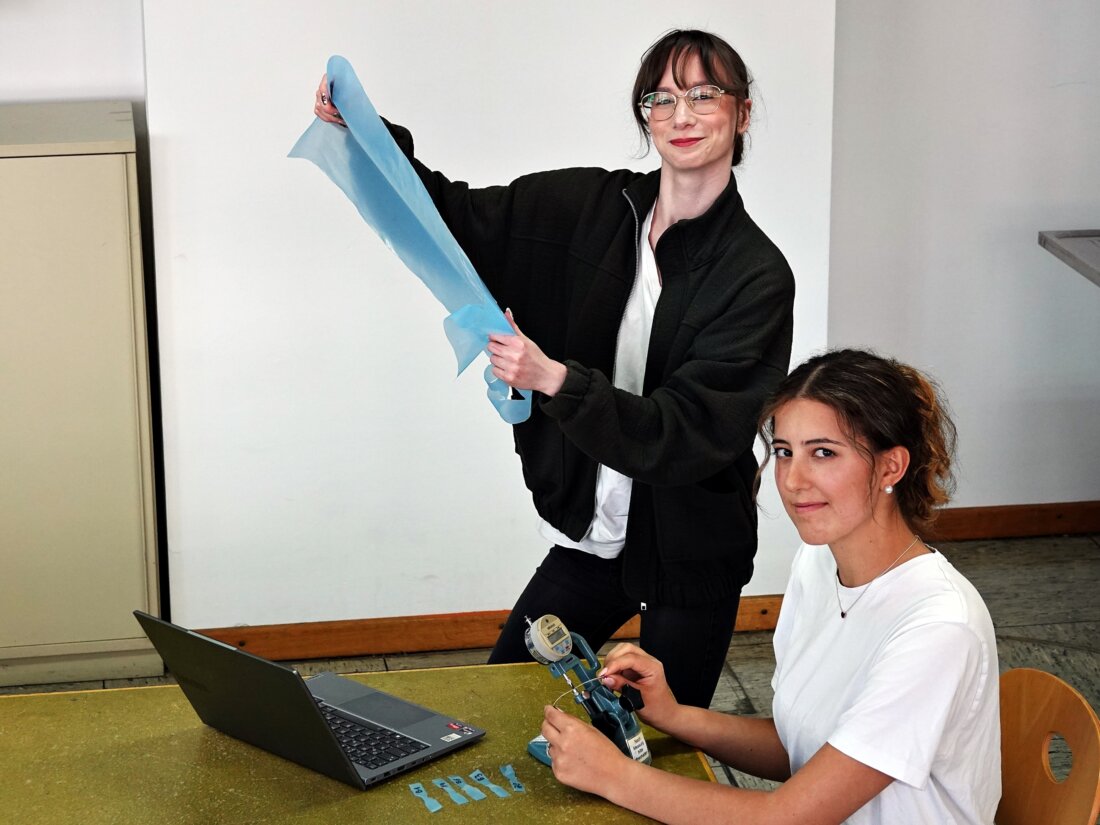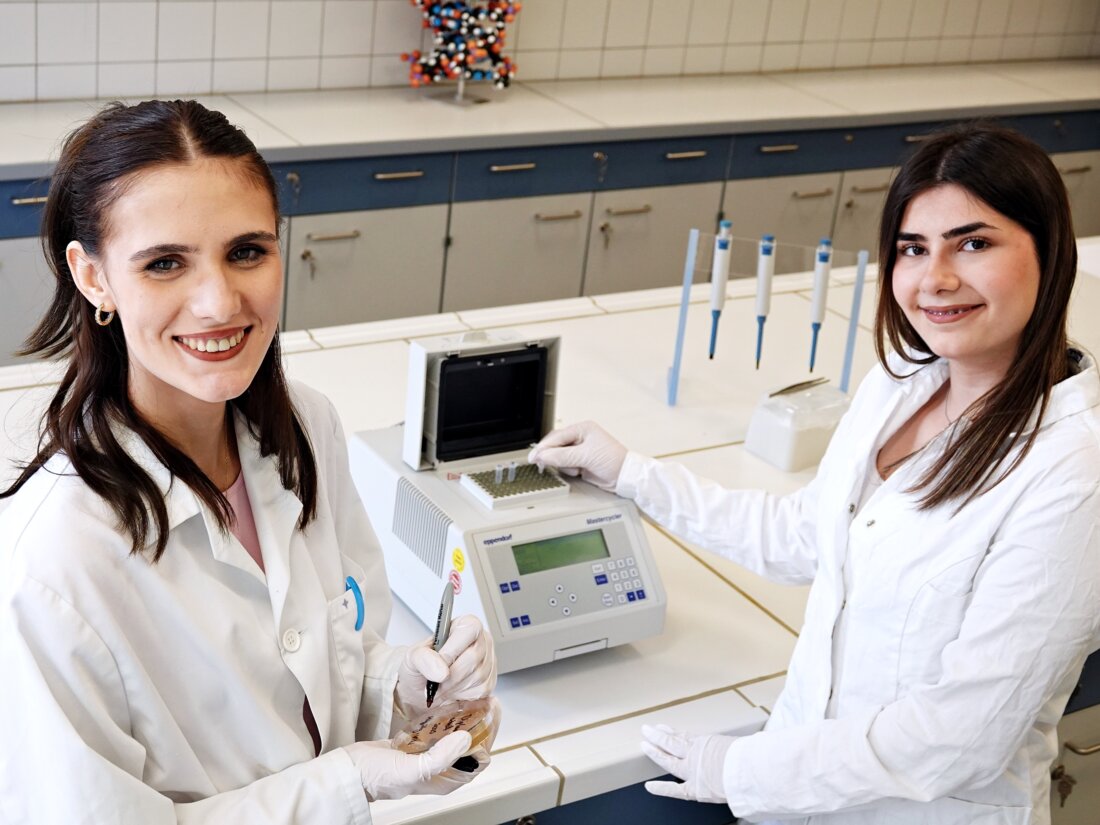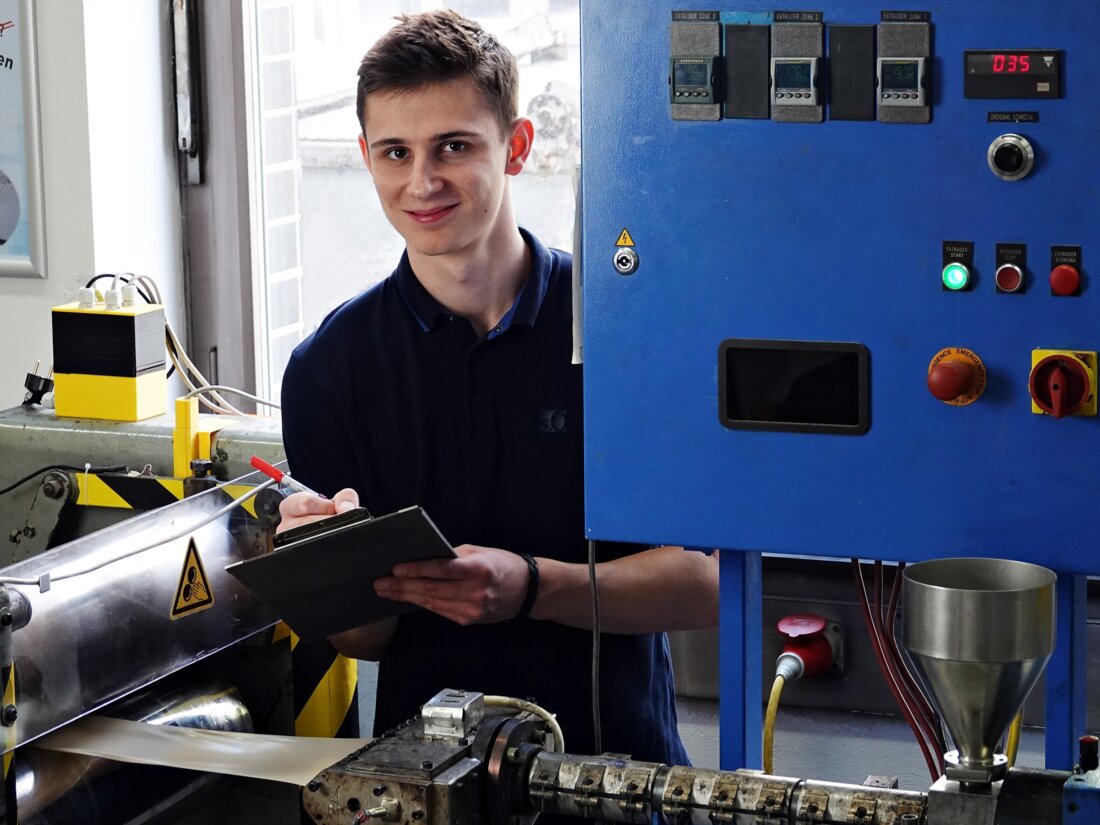VIENNA, May 28, 2025 - Three HTL diploma theses on responsible treatment of resources and innovative plastic waste treatment demonstrate how local schools are pushing the boundaries of plastic research. The students' outstanding achievements have now been recognized at the 20th Borealis Innovation Awards ceremony.
Plastics are often perceived as problematic by the general public, with no other class of materials generating as much debate. Careless handling and improper disposal of plastics in the environment are particular causes for concern.
It is therefore all the more commendable that three diploma theses at TGM have addressed these challenges and developed solutions for the sustainable use of plastics.
Magdalena Heigl and Laura Lippach dealt with the recycling of plastic films from the construction sector in their work. In addition to packaging films, the two students also investigated vapor barriers, which are made up of many different materials. Thanks to material separation and the use of suitable additives, high-quality films can be produced again from residual materials during recycling. The expert jury rewarded this work with first place.
Viktoria Boga and Migitty Iskenderian impressed the expert jury with their investigation into the biodegradation of plastics by fungi. While the two students were analyzing plastic waste, they discovered a fungus that can apparently feed on plastics. They isolated this fungus and discovered that a variety of plastics can be degraded by this type of fungus. With this discovery, the two researchers secured second place.
Sebastian Fischer dedicated his diploma thesis to the goal of reducing water consumption in agriculture. To this end, the HTL graduate developed a biodegradable agricultural film that stores water and releases it back into the environment during dry periods. The innovative films not only have a positive effect on water consumption, but can also be plowed into the soil at the end of the cultivation period. The components of the film thus act as a soil conditioner.
"It is wonderful to see that the young students at TGM are focusing on sustainability in their research projects," said Markus Horcher, Vice President Sustainability & Public Affairs at Borealis, visibly enthusiastic at the award ceremony in front of around 150 guests from industry and commerce in the TGM ballroom. "This spirit of innovation reflects the industry's conscious responsibility for a sustainable future. Borealis, as a long-standing partner of the TGM, is therefore delighted to honor this great work."
The correct use and recycling of materials is a central part of training at TGM. However, sustainable solutions require the cooperation of all those involved. Industry sees itself as having a responsibility to use materials sensibly and consumers are called upon to dispose of their waste correctly.
The unifying link is training young people to develop sustainable solutions for tomorrow and to use, dispose of and recycle them responsibly. This is the only way to contribute to a comprehensive circular economy.
1st place
Diploma thesis: Recyclability of vapor barriers and building material packaging
Project team: Magdalena Heigl, Laura Lippach
Company partner: Baustoff + Metall Gesellschaft m.b.H.
Short summary:
Plastic film waste of various kinds is produced in the construction sector, ranging from monofilms to composite films with a wide variety of material combinations. As part of the diploma thesis, the two students analytically investigated which materials are used for the product vapor barriers and building material packaging and theoretically developed possible recycling concepts.
A concept was finally tested in the laboratory, different film mixtures were recycled and the recyclates were reprocessed into films. Mechanical tests were carried out on the recycled films to assess the quality of the resulting products. The results confirm the feasibility of the recycling process and the reusability of the film waste.

Photo: Visual assessment of the recycled films
© GFKT (Gesellschaft zur Förderung der Kunststofftechnik)
2nd place
Diploma thesis: Degradation of plastics by naturally occurring fungi
Project team: Viktoria Boga, Migitty Iskenderian
Company partner: University of Natural Resources and Life Sciences
Short summary:
Viktoria Boga and Migitty Iskenderian developed a system for identifying fungi that are capable of decomposing plastic as part of their diploma thesis. Plastics such as PMMA, PP, PVC and PE were examined. The fungi Trichoderma and Fusarium were identified as degradation organisms. The young researchers have thus found natural organisms that even "eat" particularly durable and barely biodegradable plastics.
The project was carried out in cooperation with the BiMM research network at BOKU and the state of Lower Austria.

Photo: Analysis of the plastic-eating fungi
© GFKT (Gesellschaft zur Förderung der Kunststofftechnik)
3rd place
Diploma thesis: Functionalization of biodegradable agricultural films
Project team: Sebastian Fischer Company partner: Gabriel-Chemie GmbH
Short summary:
Water is an important commodity. However, agriculture accounts for the largest share of fresh water used worldwide. Around 70% is used for irrigation and literally seeps into the ground. And due to climate change, this consumption is constantly increasing.
The agricultural films functionalized by Sebastian Fischer contain water-retaining additives and are up to 100% bio-based. This allows the plants to be supplied with water during dry periods, as well as complete biodegradation, which also improves water absorption and soil structure in the long term. The films developed in collaboration with Gabriel-Chemie therefore represent an environmentally friendly and resource-saving alternative to conventional agricultural films.

Photo: Production of biodegradable films
© GFKT (Gesellschaft zur Förderung der Kunststofftechnik)
END
This news was published by TGM as a media release on May 28, 2025.
It is also available in German language.
Photo: Winners at the award ceremony
© GFKT (Gesellschaft zur Förderung der Kunststofftechnik). image. 2.34mbPhoto: Visual assessment of the recycled films
© GFKT (Gesellschaft zur Förderung der Kunststofftechnik). image. 2.15mbPhoto: Analysis of the plastic-eating fungi
© GFKT (Gesellschaft zur Förderung der Kunststofftechnik). image. 1.95mbPhoto: Production of biodegradable films
© GFKT (Gesellschaft zur Förderung der Kunststofftechnik). image. 2.19mbAbout Borealis
Borealis is one of the world’s leading providers of advanced and sustainable polyolefin solutions. In Europe, Borealis is also an innovative leader in polyolefins recycling and a major producer of base chemicals. We leverage our polymer expertise and decades of experience to offer value-adding, innovative and circular material solutions for key industries such as consumer products, energy, healthcare, infrastructure and mobility.
With customers in over 120 countries and head office in Vienna, Austria, Borealis employs around 6,200 people. In 2024, we generated a net profit of EUR 566 million. OMV, the sustainable chemicals, fuels and energy company with a focus on circular economy solutions, headquartered in Vienna, Austria, owns 75% of our shares. The Abu Dhabi National Oil Company (ADNOC), based in the United Arab Emirates (UAE), owns the remaining 25%.
In re-inventing essentials for sustainable living, we build on our commitment to safety, our people, innovation and technology, and performance excellence. We are accelerating the transformation to a circular economy of polyolefins and expanding our geographical footprint to better serve our customers around the globe. Our operations are augmented by two important joint ventures: Borouge (with ADNOC, headquartered in the UAE); and Baystar™ (with TotalEnergies, based in the US).
www.borealisgroup.com | www.borealiseverminds.com
About TGM
TGM is Vienna´s largest technical college, with around 2,800 students and 400 teachers. The course offering includes biomedical and health engineering, electronics and computer engineering, electrical engineering, information technology, plastics and environmental engineering, mechanical engineering and industrial engineering.
www.tgm.ac.at
About GFKT
The Austrian Society for Plastics Engineering (GFKT) supports the training of young plastics engineers at the Higher Technical Federal Teaching and Research Institute (HTBLVA) Vienna XX, which is better known as TGM – The School of Technology. The machines and systems required for this are made available in cooperation with the industry.
The implementation of research projects from the plastics industry is also supported. For this purpose, GFKT has founded the Laboratory for Plastics Engineering (LKT Ges.m.b.H.), as a reliable partner for national and international projects in research and development.
www.lkt-tgm.at/gfkt
Thank you for understanding that we are only able to respond to media inquiries. For all other inquiries, please reach out to us via these contact forms.
Media representatives can reach our media desk during work days in Austria between 8:30 a.m. and 17:00 p.m. (CET) via email or telephone.
High-resolution images are available for download in our media gallery.
Group Media Desk
+43 1 22 400 899 (Vienna, Austria)